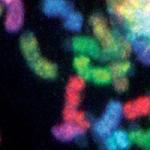
Research Topics
Roles of DNA Helicases in Genomic Stability: Genetic mutations in a class of molecular motor proteins known as helicases are linked to a growing number of human disorders, indicating that these enzymes have vitally important roles during replication, DNA repair, recombination and transcription. My research team believes that defining the biochemical and cellular functions of helicases will help us understand molecular defects associated with chromosomal variability. The focus of our group is genetic diseases frequently associated with premature aging, cancer, and/or mitochondrial dysfunction arising from genetic variations in genes encoding DNA helicases that operate uniquely in pathways of DNA repair and the replication stress response. A special topic of interest is the application of small molecules to modulate helicase activity as a tool to assign specific helicase functions in vivo and potential development of therapeutic strategies.
Biography
Dr. Robert Brosh received his B.S. in chemistry from Bethany College in 1985, M.S. in biochemistry from Texas A & M University in 1988, and Ph.D. in biology from the University of North Carolina at Chapel Hill in 1996. He did postdoctoral work at NIH before assuming his present position as a Principal Investigator in the Laboratory of Molecular Gerontology, NIA in 2000. Dr. Brosh's group is engaged in biomedical studies of DNA repair diseases. His research program also investigates the emerging importance of helicases in other facets of biology including cellular metabolism and inflammation.
Selected Publications
- Dumm AJ, Zheng AY, Butler TJ, Kulikowicz T, George JC, Bombard PT, Sommers JA, Ding J, Brosh RM Jr. SARS-CoV-2 point mutations are over-represented in terminal loops of RNA stem-loop structures that can be resolved by Nsp13 helicase in a unique manner with respect to nucleotide dependence. Nucleic Acids Res. 2025;53(10).
- Herr LM, Schaffer ED, Fuchs KF, Datta A, Brosh RM Jr. Replication stress as a driver of cellular senescence and aging. Commun Biol. 2024;7(1):616.
- Abu-Libdeh B, Jhujh SS, Dhar S, Sommers JA, Datta A, Longo GM, Grange LJ, Reynolds JJ, Cooke SL, McNee GS, Hollingworth R, Woodward BL, Ganesh AN, Smerdon SJ, Nicolae CM, Durlacher-Betzer K, Molho-Pessach V, Abu-Libdeh A, Meiner V, Moldovan GL, Roukos V, Harel T, Brosh RM Jr, Stewart GS. RECON syndrome is a genome instability disorder caused by mutations in the DNA helicase RECQL1. J Clin Invest. 2022;132(5).
- Datta A, Biswas K, Sommers JA, Thompson H, Awate S, Nicolae CM, Thakar T, Moldovan GL, Shoemaker RH, Sharan SK, Brosh RM Jr. WRN helicase safeguards deprotected replication forks in BRCA2-mutated cancer cells. Nat Commun. 2021;12(1):6561.
- Butler TJ, Estep KN, Sommers JA, Maul RW, Moore AZ, Bandinelli S, Cucca F, Tuke MA, Wood AR, Bharti SK, Bogenhagen DF, Yakubovskaya E, Garcia-Diaz M, Guilliam TA, Byrd AK, Raney KD, Doherty AJ, Ferrucci L, Schlessinger D, Ding J, Brosh RM. Mitochondrial genetic variation is enriched in G-quadruplex regions that stall DNA synthesis in vitro. Hum Mol Genet. 2020;29(8):1292-1309.
Related Scientific Focus Areas





Molecular Biology and Biochemistry
View additional Principal Investigators in Molecular Biology and Biochemistry
This page was last updated on Thursday, August 14, 2025